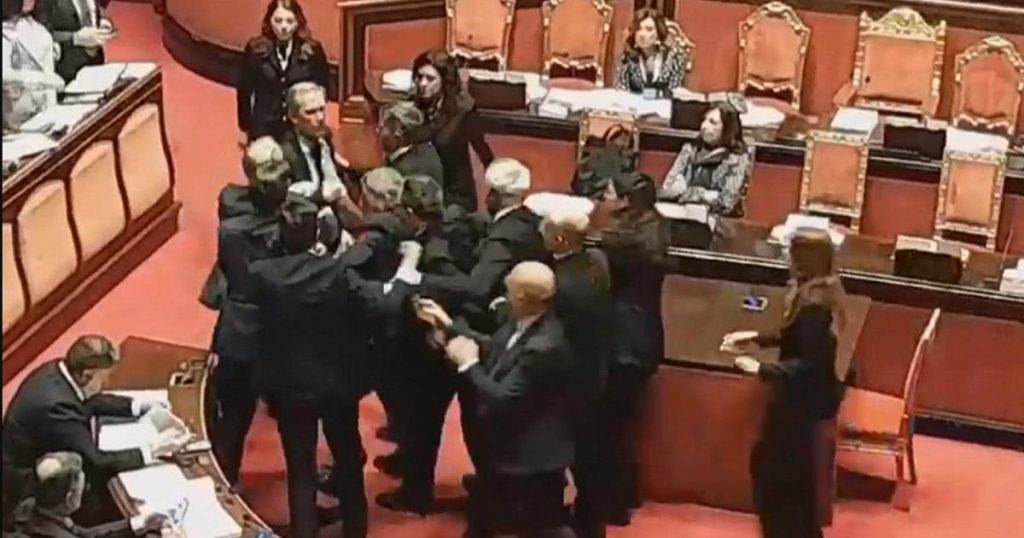Tensions ran high in the Italian Senate during the examination of a bill on the prime minister’s office. A clash between Senator Roberto Menia of Fdi and Senator Marco Croatti of M5s nearly led to a physical altercation. The incident was sparked by comments made by M5s Senator Ettore Licheri, who repeatedly referenced Prime Minister Giorgia Meloni, shouting “you are Giorgia” from his seat. Senate President Ignazio La Russa announced that the events of the last few minutes would be carefully evaluated. He suspended the session for an hour and immediately called a meeting of group leaders to address the situation.
The atmosphere had already been tense the previous evening, leading to a 10-minute suspension of the session due to an altercation between Enrico Borghi of Italia Viva and Minister for Reforms Elisabetta Casellati. Italia Viva requested a review of the footage after Borghi, while interrupting his speech, accused the minister of making a disrespectful gesture towards him. Ivan Scalfarotto later intervened, condemning the government for showing disrespect to a member of the Assembly by making an unmistakable gesture in the Chamber. He demanded an investigation into the incident to be brought to the attention of the Senate presidency. Vice President Mariolina Castellone assured that the matter would be investigated thoroughly.
The exchange between the senators and the government highlighted the growing tension in the Senate during the debate on the bill. The confrontation between members of different parties reflects the deep divisions and conflicts within the Italian political landscape. The actions and exchanges during the session underscore the challenges faced by the government in maintaining order and decorum in the legislative chamber. The incidents also shed light on the power dynamics and rivalries between the various political factions represented in the Senate.
The intervention of Senate President Ignazio La Russa to suspend the session and call for a meeting of group leaders indicates the seriousness of the situation and the need for a swift resolution to prevent further escalation of tensions. The Senate presidency’s commitment to evaluating the events and taking necessary measures to address the conflicts demonstrates a dedication to upholding the integrity and dignity of the Senate as a key institution in the Italian political system. The incidents in the Senate serve as a reminder of the challenges faced by legislators in maintaining civility and respect within the political sphere.
The heated exchanges and confrontations in the Italian Senate during the discussion of the bill on the prime minister’s office underscore the complexities and challenges of parliamentary democracy. The incidents reflect the deep-seated rivalries and conflicts between political parties and factions, as well as the struggle to maintain order and decorum within the legislative chamber. The actions of the Senators and the government officials reveal the underlying tensions and power struggles that shape the dynamics of Italian politics, highlighting the need for effective communication and conflict resolution strategies in the legislature.
In conclusion, the incidents in the Italian Senate during the debate on the bill on the prime minister’s office serve as a reflection of the broader political tensions and conflicts within the country. The confrontations and exchanges between Senators and government officials highlight the challenges of maintaining civility and respect within the political sphere. The commitment of the Senate presidency to evaluate the events and take necessary measures to address the conflicts demonstrates a dedication to upholding the integrity and dignity of the legislative chamber. The incidents underscore the complex dynamics and power struggles within Italian politics, emphasizing the importance of effective communication and conflict resolution strategies in the parliamentary system.














